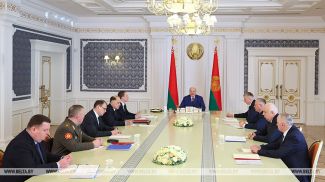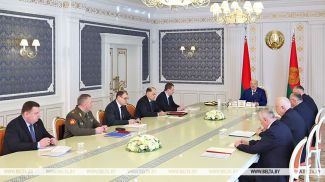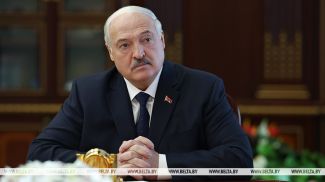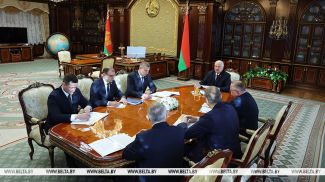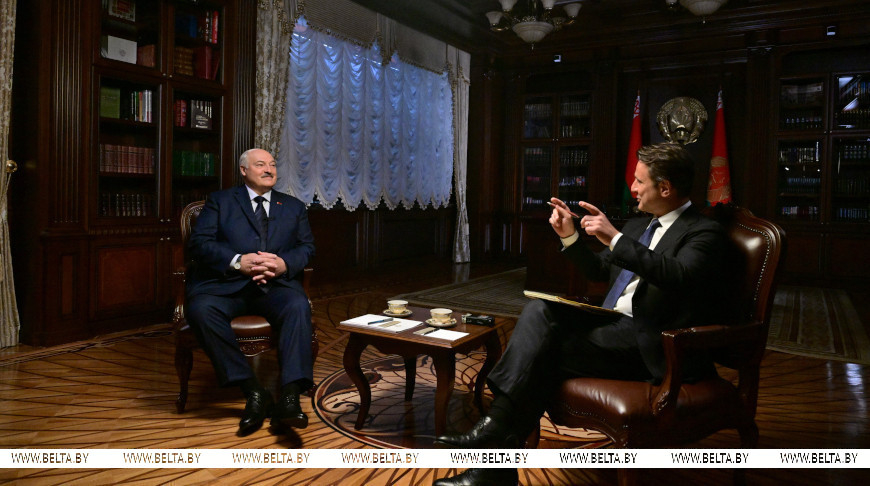
Belarusian President Aleksandr Lukashenko gave an interview to TIME Magazine. The publication’s correspondent, Simon Shuster, met with the Belarusian leader on 25 July, but until now, the name of the media outlet and the interviewer had not been disclosed. Neither the media outlet nor the interviewer's identity had been disclosed until now, per the magazine's request to maintain intrigue and exclusivity. That was the magazine's own request: to maintain intrigue and the exclusivity of the material. And now, two weeks later, it’s even more interesting to analyze this conversation in light of recent events. A few days after the interview, Aleksandr Lukashenko held informal talks with his Russian counterpart on Valaam. And just recently, Vladimir Putin met with an U.S. delegation. Will these events and their repercussions fit together like pieces of a puzzle?
But let's get back to the interview. Aleksandr Lukashenko spoke with the journalist for about three hours, including off-the-record. The interview covered a wide range of controversial topics, resulting in a candid and substantive discussion. Here are the key takeaways.
TIME journalist’s journey to Belarus; reasons for the interview
At the very beginning of the interview, journalist Simon Shuster recounted his journey to Minsk and said why he requested the meeting at this particular time. “I truly appreciate this opportunity to speak with you, especially at such an interesting time in U.S.-Belarus relations,” the journalist said at the start refereeing to the recent visits by U.S. diplomats that attracted significant attention.
“This uptick, if I may call it that, in dialogue between the Trump administration and the Belarusian government,” he noted.
According to him, the editorial team deemed this an especially opportune moment to arrange travel to Belarus and interview its president while also using their correspondent to gain firsthand understanding of the situation on the ground.
Simon Shuster emphasized how much he appreciated Aleksandr Lukashenko's conversational style - completely open and frank. “I truly value your willingness to address any question. Not every leader I've interviewed maintains this approach,” he noted.
Aleksandr Lukashenko responded that otherwise (without anticipating a frank and detailed discussion) there would have been no point in undertaking such a long journey to conduct the interview in the first place. “Otherwise why would you need to fly all this way from New York? And what’s more - kudos to you for coming to us like an ordinary person, enduring all those border difficulties and hardships.”
“Yes, it was quite an experience. Five hours on the border," the journalist remarked, clarifying that Belarusian border guards weren't responsible for the delay.
This led to discussion of recent reinstatement of border controls between certain EU countries within the Schengen zone. Official reasons are combating illegal migration, but as the president noted “one can always find justification if needed.”
On the talks with official representatives of the United States
Speaking about Belarus-U.S. relations, the head of state noted that bilateral ties had initially been good – even recalling a time when he played hockey on the same team as the U.S. ambassador. But later, especially during Russia’s special military operation, relations deteriorated significantly.
That said, ‘backchannel communications’ have been maintained. They operate mostly through intelligence services because they are beneath the threshold of public awareness. “That’s why I personally oversaw this process. Contacts were maintained through intelligence channels and I could bring in the Foreign Ministry if necessary, or government officials for specific matters, like sanctions. When discussing next steps or conceptual frameworks – particularly when formalizing a draft document – I engage the Foreign Ministry. However, primary communication still flows through intelligence channels. On your side, Christopher Smith was involved [Deputy Assistant Secretary at the U.S. Department of State]. “
“A decent man – I always jokingly call him a CIA guy when he comes. We’ve met about five times already,” the head of state said.
According to the president, this person from the American side played a pivotal role in organizing visits of U.S. officials to Belarus – including the June visit of President Trump’s special envoy for Ukraine Keith Kellogg who met with Aleksandr Lukashenko. “This is already the fifth U.S. delegation. By the way, they initiated it. And credit where credit is due – Chris Smith played and still plays the key role here,” Aleksandr Lukashenko said.
Naturally, President Donald Trump is aware of these developments, though Aleksandr Lukashenko doubts he’s deeply immersed in this matter.
The president noted that the U.S. side initiated the talks in Minsk and approached Belarusian diplomats based in New York with this proposal. “We receive signals from the Americans: they’d like to talk, discuss some regional and global issues. They’d like to talk about it. Well, we’re open to that,” Aleksandr Lukashenko said. He noted that while the Belarusian side was interested in such dialogue, it did not insist on making it public.
“What is America? Well, I don’t need to tell you what America is. It’s the world’s leader. Yes, it is weakened. Yes, sometimes you do strange things there for unclear reasons – the president says one thing in the morning, another in the evening and acts differently. We’ve seen it all there. But America remains America, and our relations are far from perfect. And the sanctions. What positive outcomes have they achieved? We are dependent on America – and not just us, but many other countries in today’s world, though the situation is changing. If they propose a dialogue, it’s good,” the president said.
Aleksandr Lukashenko stressed that the status of the U.S. negotiators was not a critical factor for him. “That’s my credo, my principle. You need to talk to everyone if you want normal relations. And if you don’t talk, you’re slowly moving toward war. We don’t need that. So there was this proposal, they came and maintained impeccable decorum throughout,” he explained.
The head of state emphasized that when Belarus began intensifying dialogue with the United States, it did not set out to achieve specific results, including getting the sanctions lifted, and generally does not have much faith in the United States’ serious commitment to normalizing relations. For example, Belarus still does not have a U.S. ambassador. However, naturally, if the sanctions were to be lifted, the Belarusian side would consider it a major step toward normalizing relations.
On the prospects of meeting with Trump
The head of state was asked whether his meeting with the American leader can be arranged as a result of the dialogue with representatives of the United States of America, who had visited Minsk recently.
Aleksandr Lukashenko said that the meeting is not on the agenda although it could be extremely useful for Donald Trump. “It would be extremely useful for him if his statements about the domestic and foreign policies are sincere,” the Belarus president noted. “Because unlike all of you, who runs around him, I could open his eyes on many things. Including the American-Russian relations. Particularly with regard to the conflict in Ukraine. Well, naturally, on Belarus’ stance.”
The head of state added that on the whole, his attitude to Donald Trump is positive and he publicly spoke in his support when President Biden was in power in the USA and an entire campaign was launched against Trump. “I openly criticized your so-called democracy, your President Biden, and I supported Trump. What you did to Trump prior to the latest presidential election was a massive disgrace,” he pointed out.
At the same time the Belarus president was critical about Donald Trump’s public actions and statements. They are often contradictory and unsubstantiated and therefore are not accepted seriously and do not invoke trust. His multiple statements about the USA’s intention to introduce duties against other countries are the latest example. “I guess your entire policy is focused on the duties. And one kind of duties in the morning, another kind in the evening. But before talking about duties only to later cancel them or disavow your statements, you have to consider all the factors. It is not that complicated,” Aleksandr Lukashenko believes.
In his opinion, the state of affairs stems from the character of the American leader, due to which the people around him do not dare speak sincerely or critically about various decisions and statements by Donald Trump. In particular, this matter was raised when USA representatives visited Minsk and met with the Belarus president.
Aleksandr Lukashenko mentioned one episode: “We discussed and talked about things for a long time. Then I said as a joke that the United States of America could do with a dictator. They said they have plenty of their own. I disagreed. I said I meant me. I said I could tell their president a lot.”
On close relations with Russia and loudmouths in the EU
In one of the questions, the journalist voiced the existing opinion that the U.S., by restoring dialogue with Belarus, is seeking to somehow drive a wedge between it and Russia. “Well, that’s someone’s dream,” the president remarked.
The U.S. has always had such intentions. George Soros even spoke about this back in the 1990s when he visited Belarus and met with Aleksandr Lukashenko. “I said: ‘George, I am sorry, but I will not conduct this policy in an American way, I will not do this. Therefore, this is probably our last meeting.’ I made it clear that we would not cooperate. And since then I have adhered to this policy,” the president said.
Aleksandr Lukashenko pointed out that Belarus and Russia maintain close allied relations, which have developed not only historically but are also codified in numerous agreements. Belarus strictly adheres to all its obligations. “This is why some Western Europeans and the rest, even Americans should stay out of our relations with Russia. We have relations in the military field. You know. Starting with Oreshnik missile systems and ending with nuclear weapons. Our relations are of military technology nature, of economic nature. It is our market. The Russian market is the largest market for Belarus. We buy energy resources from them. Only from Russia. And so on. Can anyone replace it for us? No. Even from the practical point of view. No one can. Let alone our legal agreements,” the head of state said.

“Russia has already stipulated in all its documents that an attack against Belarus is an attack against Russia. We have the same stipulations. An attack against Russia is an attack against Belarus. This is why we have the tightest relations. Nobody can sever them. Particularly loudmouths from the European Union,” he added.
The discussion also touched upon how Russia perceives the restoration of official-level Belarus-U.S. engagement. Regarding this matter, Aleksandr Lukashenko noted: “Discussing third parties and states that are not present here is out of the question. It is undiplomatic behavior. Discussion of general matters in a conceptual way is possible but making backroom deals is a taboo. We don’t make backroom deals with Americans behind Russia’s back,” the president stressed.
On the first step towards ceasefire
At the same time, there are situations when the Americans, being aware of the strong personal relationship between the two leaders, ask the Belarusian head of state to relay certain information or proposals to the president of Russia. One recent example cited by Aleksandr Lukashenko involved an idea to establish an aerial ceasefire between Russia and Ukraine. According to Western officials, President Putin reportedly declined this proposal.
“They tell me: ‘We tried to reach this kind of agreement with him. He doesn’t want it.’ I respond: ‘That can’t be right’ (I’m just giving an example – there were a couple other issues too). I say: ‘This is something I’m ready to discuss with Vladimir Vladimirovich – this particular issue.’ So I call him and say: ‘Vladimir Vladimirovich, here's the situation. They're raising this question.’ He tells me in a friendly, brotherly way: ‘What are you talking about? Of course we’re for it! We’re not opposed. But let Ukraine stop their strikes too,’” Aleksandr Lukashenko said sharing the details of the talks.
“I conveyed everything [Russia’s response to the West]. I say: ‘You don’t really want this.’ – ‘What do you mean we don’t want it?’ Then warn Ukrainian leadership to stop bombing Russia. Russia won’t conduct aerial strikes against Ukraine.’
The head of state believes that aerial ceasefire would be a good first step towards full ceasefire. However, in this case, it is absolutely impossible to claim that Russia is against it and supposedly seeks to bomb peaceful cities (although this is precisely how it is portrayed in the West). “I had a phone conversation with Putin when the Russian troops were actually near Kiev. I know his position,” Aleksandr Lukashenko said.“When I asked him on the phone: ‘Vladimir Vladimirovich, you’re in Kiev, you’ve taken Kiev. This should mean the end of the war.’ He responded: ‘What do you mean taken?!’ He said they’d taken cover. His exact words: ‘They’re holed up in kindergartens, in schools. Should we bomb kindergartens and schools?’ Then the Russian president decided to withdraw troops away from the Ukrainian capital, believing certain people who promised that the war would end. “They withdrew. Did the war stop? No,” Aleksandr Lukashenko said.
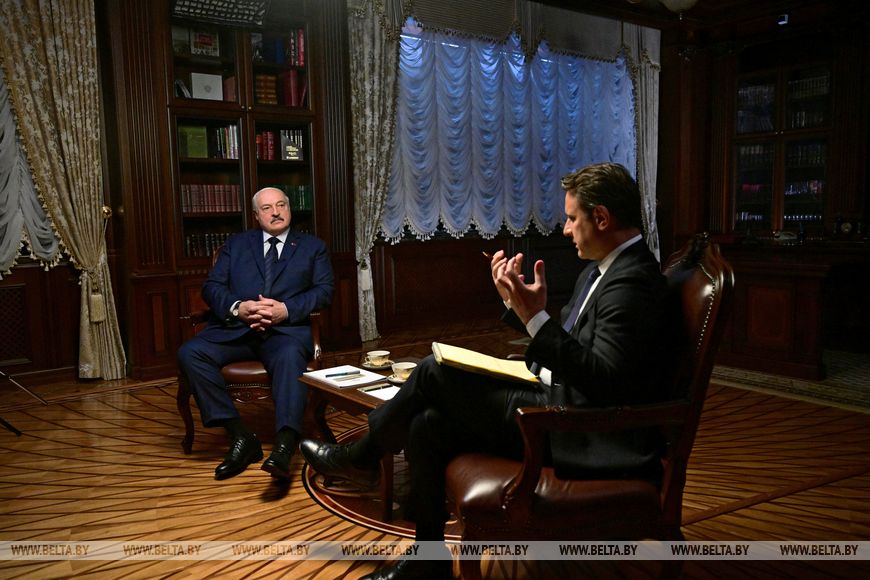
According to him, the West is doing its best to portray the Russian leader as “bloodthirsty”. It is absolutely not true. This is done for specific purposes – information-psychological operations are being conducted, a field in which the West has excelled and has taught these techniques to the Ukrainians. One example is the events in Bucha. “The reality was completely different from what was shown. It was a carefully orchestrated operation designed to portray Russians as aggressive, bloodthirsty murderers. Nothing of the sort actually occurred there,” Aleksandr Lukashenko said. “We know exactly who carried this out. We even have the license plate numbers of the vehicles used by those who organized this in Bucha. I’ve spoken about this publicly.”
“So let’s not talk about Putin bombing civilians,” the head of state said. “Does Zelensky personally control where every drone flies? They keep crossing into our territory. We’ve documented about fifty cases already.”
“So talking about Russia targeting civilians while portraying Ukrainians as innocent angels in white gloves is simply unfair,” the president is convinced.
On sentiments within Russia’s political establishment
Another aspect touched upon in the interview is a certain wariness among part of the Russian establishment regarding the intensification of dialogue between Belarus and the USA. “Russia has diverse opinions, just like America,” the head of state said.“There are people who are deeply concerned.”
Oddly enough, the policy of multi-vector diplomacy pursued by Belarus has itself become a subject of criticism. “This is just one group of people, although it’s headed by a respectable institution,” the president noted. “I’ll discuss this topic with Vladimir Vladimirovich. This is just one group. There are various journalists too.”
In response to the journalist’s question, Aleksandr Lukashenko stated that he saw no danger in the existence of such an opinion or such a group, including in terms of influencing the views of the Russian leadership. “It’s unpleasant, to be frank, if someone in Russia thinks and writes reports like that. But as I said, there are all kinds of people. But the main trend remains: full support of our position and complete mutual assistance. There’s nothing to reproach us for,” the president said.

According to him, he and Vladimir Putin have developed “absolutely trusting and cordial relations”, and it is unlikely any world leader knows the Russian president better. “This doesn’t mean I don’t have my own point of view. I dare say that no one – neither inside the country nor abroad – speaks to him as frankly to his face as I do,” Aleksandr Lukashenko remarked.
On Belarus’ foreign policy
Aleksandr Lukashenko noted that the West sometimes claims that Belarus is ‘occupied by the Kremlin.’ In this context, the president pointed to the situation in neighboring countries. Take Ukraine – a wealthy, powerful nation, three times richer than Belarus – it’s been under Western occupation for a long time.
“And who’s occupying Poland? And the Baltic states that grovel not even to the Americans – the Americans probably look at them with contempt by now. They grovel to the Europeans, to those same Poles. They throw crumbs from the table, and they rush to peck at them like chicks. Aren’t they occupied?” the head of state asked.
“We all depend on someone – especially medium and small states. And we all strive to lean on someone, to be in an alliance, to ensure our security among other things. It’s called a balancing policy. I’ve often been criticized for this, accused of trying to ‘sit on two chairs,’ so to speak. I’ve never actually sat on two chairs,” Aleksandr Lukashenko said.
He emphasized that Belarus has always sought to develop friendly relations with its neighbors. After all, as the head of state often says, neighbors are God-given – you do not get to choose them.
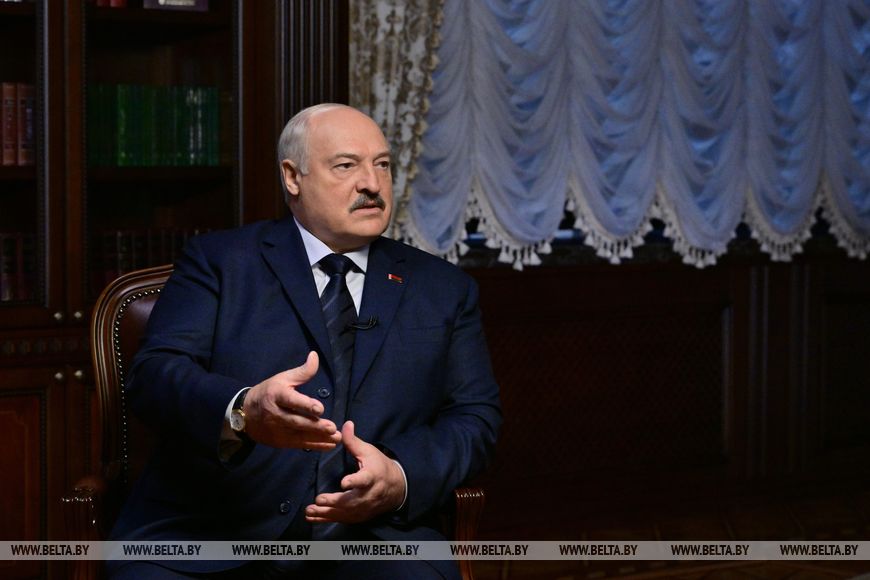
“I have to maintain relations with them. I tell the Russians the same thing. And besides, I have certain interests in these states, too, and in the European Union. We have interests even in distant America – primarily economic ones, as well as diplomatic ones. What’s wrong with that? It’s only natural,” the president remarked.
He added that Belarus counts Russia and China as key allies, though it also prioritizes ties with distant nations.
“This is only natural. And the world is changing. You can’t just climb into some cart, like they did 100 years ago or in Soviet times, and go galloping off in it forever. The world has changed, and we must change too. If we don’t adapt, we’ll be ground down, crushed, and destroyed,” the Belarusian leader is convinced.
On Russia’s apprehensions and the start of the special military operation
Several questions during the interview addressed the beginning of Russia’s special military operation in Ukraine and the events of February 2022, though the president had spoken on this subject multiple times before. Aleksandr Lukashenko recalled that a large-scale joint military exercise with Russia was being conducted on Belarusian territory in February 2022. “The exercise ended. It’d taken place at southern ranges near Brest and Baranovichi. They [Russian troops] began withdrawing. Picture this: Gomel, the southern sector [of Belarus]. Some by air, but mostly via rail – right along the Ukrainian border, practically. Then at some point they turned south, to the right, and entered Ukraine during this withdrawal,” the president said.
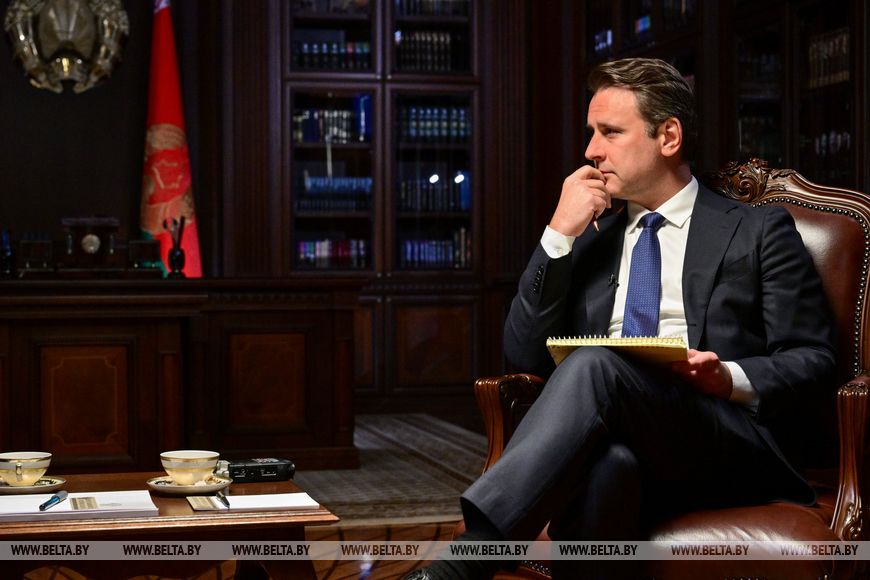
“Those were troops from Russia’s Eastern Military District – from the Far East. I asked: ‘Why would Russian forces move toward eastern Russia via Kiev? Why was Putin routing them back to Russia through Kiev?’ That’s a question for both Zelensky and Putin,” the Belarusian leader said.
The head of state explained that when planning such serious military operations, the circle of informed individuals is extremely small – and he was not among them. “When an operation begins, only a handful of General Staff officers know the details: the when, the how, the troop numbers. Yes, plans may be drafted in advance. And they are drafted in advance. But the actual timing? That’s known only to them,” the president remarked. “No one, except a few people, could be privy to these plans. So regarding the fact that I wasn’t informed and so on, I took it calmly. Especially since this wasn’t a joint operation. If the general staffs had been working on some operation together – that would be a different matter.”
Aleksandr Lukashenko pointed out that in February 2022 – even before the start of the special military operation – the situation in Donbass had deteriorated sharply, prompting Russia to organize bus evacuations of civilians. At the time, the Belarusian president was visiting Russia and, during discussions with President Vladimir Putin, was in the know about these developments. As Aleksandr Lukashenko recounted, Vladimir Putin had expressed concerns about aggressive Western actions at that time. “For some reason, he feared a Western ‘stab in the back’ though he never mentioned it [plans for the SMO]. But he said: ‘If things escalate in Ukraine, Donbass, and so on, they might strike us from behind.’ I responded: ‘You needn’t worry about that. That’s my area of responsibility. I won’t allow anyone to shoot Russians in the back.’ And I’ve stated this publicly, quite frankly,” Aleksandr Lukashenko said.
According to him, there was no premonition at that time that this would escalate into such a serious confrontation. Although the Americans had forewarned Ukraine about what might happen in February 2022. “They warned the Ukrainians about it in detail throughout the week – I remember this. But they either didn’t believe it or only half-believed. We didn’t believe it at all,” the president said.
On Belarus’ stance and assistance to Russia and Ukraine
It is well known that from the very beginning of the conflict, Belarus and its leader have maintained a consistent position – the parties must come to the negotiating table and find peaceful solutions. For its part, Belarus has made every effort to facilitate this and continues to insist on returning to dialogue. Regrettably, the active phase of hostilities persists. Yet even in this situation, the opposing sides maintain communication channels.
“I am certain these discussions involve intelligence services from both sides, supplemented by the military and civilian representatives – including parliamentarians, commissioners for human rights and children’s rights, and other stakeholders,” the president said. “All technical negotiations take place on Belarusian soil – under my supervision. After all, Ukrainians are dear to me, and so are Russians – they’re our kin. I want everything to go well. And where they cannot meet directly, Belarusians step in to mediate.”
In this segment, the head of state outlined Belarus’ role in facilitating the exchange of bodies between Russia and Ukraine. Given the big scale of the exchange, Ukraine requested to conduct it through Belarus by rail – despite having previously destroyed those very railway lines themselves due to security concerns. “I said: Fine, we’re ready to do it by rail – let them rebuild it. They restored the blown-up railway section. But they set a condition: only Belarusians. Trains carry bodies into Ukraine and from Ukraine into Belarus, then to Russia, wherever,” Aleksandr Lukashenko said.
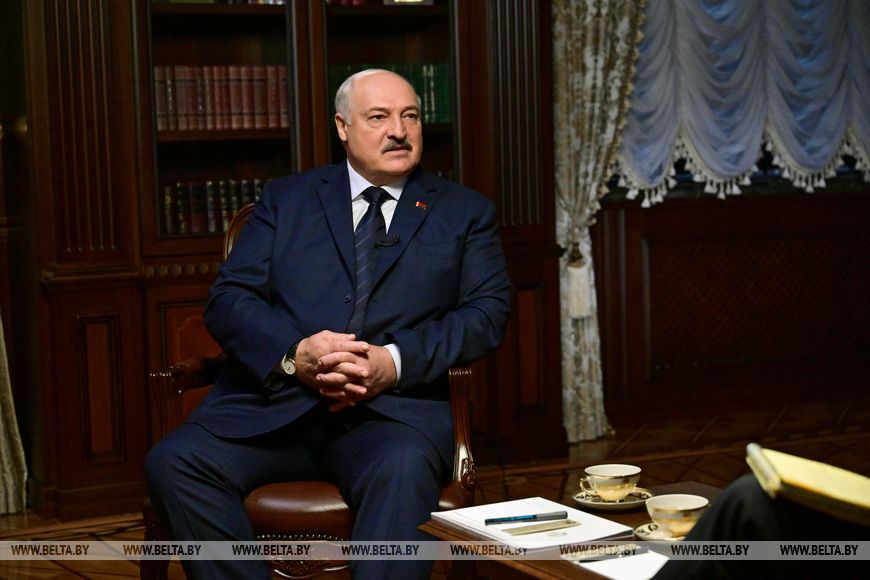
On events in Russia’s Kursk Oblast
The journalist recalled Ukraine's August 2024 incursion into Russia's Kursk Oblast. In this context, he asked why Belarus hadn't supported its ally, given their binding military commitments, particularly the mutual security guarantees agreement within the framework of the Union State.
“You see, it wasn’t Ukraine attacking Russia. That’s perhaps your interpretation. War was ongoing, a clash occurred. The fighting was already underway. In combat, sides advance and retreat. Moreover, we properly assessed the situation. There was no need for our involvement,” Aleksandr Lukashenko said. “I knew exactly how the Russians would act when liberating the Kursk land. Putin informed me. I knew there would be an operation, and I knew what forces would be involved. So any talk of us participating in combat... It wasn’t an attack. It was a battle. During this engagement, they [Ukrainians] exploited Russia’s defensive gaps –identified this vulnerability and advanced into Kursk Oblast with substantial forces.”
“Strategically, Putin was right. At the time, I didn’t believe when he said it was a military mistake. In fact, they [Ukraine] committed massive forces there. And not just any forces: their best-trained units. They advanced. Now, practically all of those Ukrainian armed forces have been destroyed. They achieved no gains. And they left other frontline sectors exposed,” the president noted.
He further stated that had Belarus become involved in combat operations, it would have led to significantly different political and military consequences.
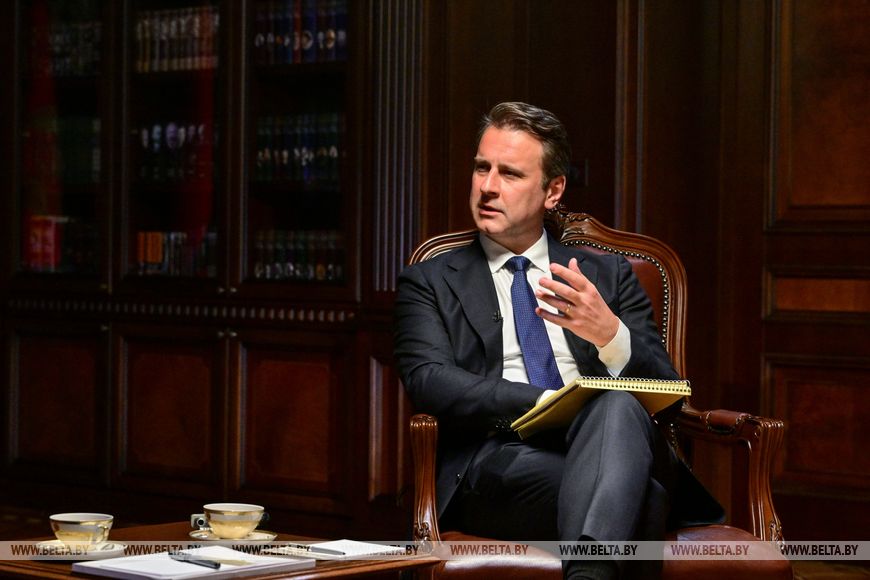
“Russia fully understands (we certainly do) that if we openly enter the war, we’ll face far greater problems. Russia understands perfectly well that it would be very hard for us to defend this extended border, especially since it wouldn’t just be Ukrainians fighting us. This would become a pretext for NATO sending troops into Ukraine. The fact is, mercenaries or rather, Western personnel disguised as mercenaries in massive numbers (Germans, French, British, Poles, and others) would flood in. We’d then have to engage against what would effectively NATO forces. We understand this perfectly well,” the head of state said. “Next. They will hammer Belarus with missiles. We’re right next door. We understand this. And so do the Russians.”
According to Aleksandr Lukashenko, this matter doesn't even warrant discussion with Russian leadership. Both the president and military commanders fully comprehend the situation.
“Incidentally, CIA Director Burns visited us. I told him plainly: we have no intention of going to war or crossing border but we are assisting Russia here,” the president emphasized. “His main concern was whether Belarus would be dragged into the war, border issues and such. I told him: ‘Look, we haven’t even had that kind of discussion with Russia.’ But, I added, there are things we can do here and we’re doing them. The Americans already knew. We weren’t hiding it. We were training personnel. Well, I pointed out: ‘You [Americans] are training Ukrainians, their pilots. And not just Americans. But also British, Germans, and others. ‘Yes, we are,’ he admitted. ‘Alright,’ he said, ‘then we'll drop this claim. But you're not planning to cross the border and fight in Ukraine, are you?’ ‘No, we have no such plans.’ This was essentially my conversation with Burns. This remains our position.
On nuclear weapons and unacceptable damage
The head of state noted that Russia makes a significant contribution to strengthening Belarus’ defense capabilities. Aleksandr Lukashenko explained that Russia understands Belarus’ strategic importance for ensuring its own national security, which is why it provides support in this matter.
“Let me be absolutely frank: when we helped Russia significantly (with ammunition and more), I told my big brother, my friend: ‘You know, I understand all this – the situation is what it is, with the Poles causing trouble and all the rest. But I need strong guarantees.’ – ‘What kind?’ I said: ‘Nuclear weapons must return to Belarus.’ And they have been returned.’ Do you really think anyone would start a war against a nuclear power? Look, no matter how much you rant about North Korea, you don’t attack it,” the president remarked.
In response to a follow-up question from the journalist about Belarus’ nuclear doctrine, Aleksandr Lukashenko stated that he had signed a decree regulating the handling of nuclear weapons. “It’s stored in safe places by authorized personnel. We fully understand what this is and how to proceed. The targets are predetermined,” the head of state said.
“Russia has enough capacity to reinforce us. And we prepare for war. I’ve said this openly. Every day, every month, we prepare for war – precisely to avoid it,” the Belarusian leader said. “We know what must be done. We’ve learned from every recent war. Our doctrine is based on delivering unacceptable damage to Poland, Lithuania, Latvia, Estonia or whoever goes to war with us. Unacceptable damage. I’ve just described one element of this. So they know: while we might not win such a war, we’d give them a bloody nose. And Russia, to the extent we currently require, is and will remain an ally,” the president said.
Aleksandr Lukashenko reminded that by the end of the year, Belarus will have the Oreshnik missile complex capable of carrying nuclear warheads. The initial deployment sites for these systems have already been identified.
“No one wants to use nuclear weapons – not Putin, not me, not anyone else. We’re not suicidal. But your satellites, your friends and allies should understand it too. And I’ve said it openly: ‘If anyone crosses our border, we’ll respond immediately with every weapon we have.’ This isn’t intimidation, just a warning,” the president emphasized.
On a successor and a new presidential term
Personal topics were also touched upon during the interview. The reporter noted that the Western media often name the head of state’s youngest son Nikolai as Aleksandr Lukashenko’s potential successor.
“No, he’s not a successor. I knew you’d ask that. No, no, no. You could really offend him by suggesting that,” the head of state said.
Aleksandr Lukashenko admitted that the next president of Belarus might pursue a slightly different policy. “I only would like them not to tear everything down, but proceed as I did - leaning on the shoulders of the strong, building on what already exists, steadily evolving the country without this destructive revolutionary upheaval. If they convince the society that it needs a different direction, fine, so be it,” the president said.
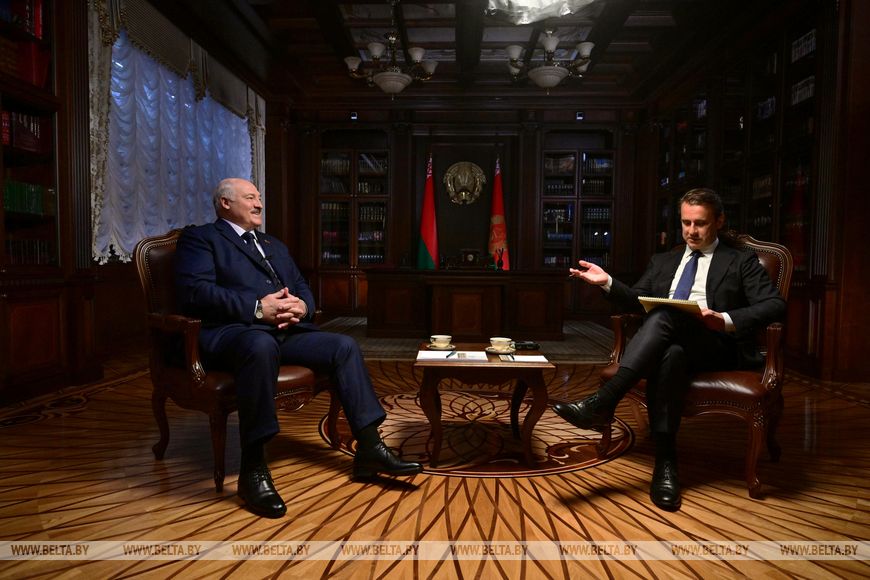
The head of state was also asked whether he was planning to run for a new term: “No, I am not making any plans now. I am not planning anything. The only thing I’ve thought, yet never voiced, that, well, Trump is nearly 80 and he still looks presentable…”
A demarcation line between Ukraine and Russia
Getting back to the matter of peaceful resolution of the situation in Ukraine, the reporter asked the Belarusian leader what he thinks the demarcation line between Ukraine and Russia may look like in the future. According to Aleksandr Lukashenko, it depends on what parties to the conflict agree. “The parties can agree to have a demilitarized (or actually, more accurately, militarized) zone on both sides - one, two, maybe five kilometers wide. It’s horrifying,” the president noted.
“It is horrifying. A massive dead zone,” the reporter agreed.
“Yes, a dead zone. But I hope it won’t come to that. It should be a regular border. Yes, with enhanced security on both sides. But this zone could still be functional. After all, we have them today and we had border zones in Soviet times, too. Entry was prohibited. Or allowed only with special passes, permits, and so on. But people lived there,” Aleksandr Lukashenko recalled. “This is why it all depends on agreements. Then life will adjust things. And borders may be removed later on.”
The Belarus president is convinced that Vladimir Putin would agree to organizing a proper life for people near the border faster than Vladimir Zelensky: “He is stronger, more decisive.”
The Belarusian head of state also remarked that if Vladimir Zelensky had listened to him back in the day, Ukraine would not have lost so much territory.
“If negotiations are conducted reasonably, with Russia making concessions to Ukraine, and Ukraine to Russia (these terms must be defined), Russia will never fight Ukraine again. Never,” Aleksandr Lukashenko is convinced.
He also spoke about opinions that Russia is getting ready for a war on NATO and would like to attack the Baltic states and Poland. “It is utter nonsense. Believe me, it’s not happening. I know this for certain. Putin and Russia’s military-political leadership have no intention of fighting NATO. It would be stupid. Definitely in the foreseeable future. Unless you do some foolish things… We have everything we need right here,” the president stressed.
At the same time he did not rule out that the situation at the battlefront may change so much that the border would go along the Dnieper River and Kiev could be left on the Russian side. “They should be afraid of losing entire Ukraine. On the whole, it could be carved up: Hungary takes a slice, Poland is already rubbing its hands to grab Western Ukraine and so on. And only some sliver of land will be left,” Aleksandr Lukashenko added.
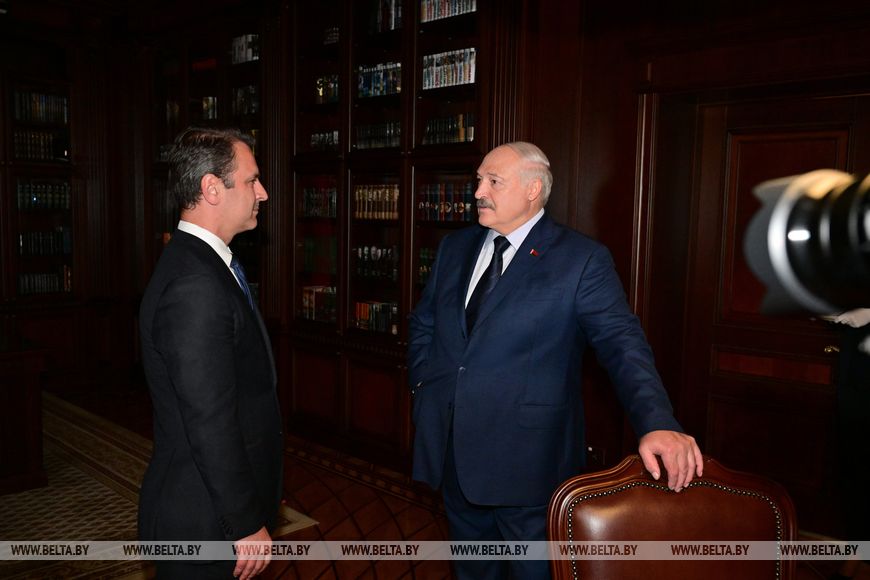
“Russia will not suffer a defeat. A defeat would cost a great deal for all of us. Primarily for you. Including people across the ocean. This is why this nuclear power with the largest nuclear arsenal will not suffer a defeat. Never ever! While Ukraine may suffer a defeat. We shouldn’t allow it. Let’s make a deal now,” the Belarusian leader urged.
Negotiations between Russia, USA, and Ukraine
Aleksandr Lukashenko reminded that when the first negotiations on resolving the crisis in Ukraine were taking place in Minsk, he talked about the need to get Americans involved in the process, otherwise nothing would be achieved. However, neither Donald Trump during his first term nor Joe Biden took part in the negotiations.
The Belarus president believes that the USA’s current approach based on ultimatums is also unacceptable. Moreover, Aleksandr Lukashenko is not sure that it is not a performance staged by the USA.
“One should not do things like this. He cannot come, make a statement, and give 50 days as the deadline. It is not Iran where you can drop three bombs and report you are out. Let’s make peace, men. You have to meet and talk,” the head of state stressed.
In his words, the Russian president may agree, for example, to an aerial truce but Ukraine should make this step at the same time.
“Three people should get together somewhere. Trump and Putin should come to terms on the first day and should invite Zelensky. You can talk about Russian-American relations on the first day and about this problem on the second day. Invite Zelensky. Put this aerial truce on the table,” Aleksandr Lukashenko said.
The reporter recalled that Vladimir Zelensky had invited Vladimir Putin to come to Saudi Arabia for negotiations, however, the Russian president had ignored this invitation. Aleksandr Lukashenko remarked he had discussed the matter with his Russian counterpart and would have done the same in his position.
“Frankly speaking, when Putin asked me what I would have done, I told him: ‘Vladimir, there is nothing for you to do over there.’ It was my opinion. You see, it looked like some posturing. That guy came: ‘I am waiting for you here. Come to get roasted. Trump is here somewhere.’ You cannot do things like that in politics. And Putin will never go for it. It was the case when it was impossible for him to come under any circumstances. Frankly speaking, I backed him up then. I told him: ‘Right. There is nothing for you to do over there.’ What kind of posturing was that?” the head of state wondered.
“Let’s make up our minds in advance. For instance: the hero city of Minsk, Istanbul, Geneva. It has been decided. This meeting will take place in a month. We can discuss American-Russian relations on the first day, for instance. On the second day if we come to an agreement about some draft document, we will invite Zelensky, Lukashenko, Petrov, Sidorov. It will look proper. In advance. But I saw how he jumped out of the aircraft like some little kid: ‘I am waiting for Putin’. What are you on about? Just in case he is the president of a huge nuclear power on par with the United States of America,” Aleksandr Lukashenko remarked.
The president is convinced that Vladimir Putin and the Russian society want peace and are ready for talks: “Treat him with respect. It is not part of his personal character. It is part of our character. As they say, part of the Russian world, of Slavs, and so on. And including Americans. Imagine Trump in Putin’s position. Putin is flying somewhere across the Middle East while some Zelensky that you have roasted for some unknown reason in the Oval Office called Trump… Or didn’t call but passed a word via mass media: ‘I am sitting here waiting for that guy and the other one. And Trump, you should come, too.’ Listen, after this he would not supply a single machine gun to Ukraine due to this humiliation.”
A possible meeting of Putin, Trump, and Zelensky
While talking to the reporter, Aleksandr Lukashenko confirmed he is ready to organize a trilateral meeting of Vladimir Putin, Donald Trump, and Vladimir Zelensky. The president stressed that such negotiations should not be organized spontaneously. They require preliminary work and preparations.
He admitted that such negotiations can be organized in Minsk. In his words, Vladimir Putin would be pleased to meet with Donald Trump in the Belarusian capital city. The American leader will be satisfied with the meeting as well, the head of state is convinced.
“Let’s make small steps. But Trump talks about a 50-day deadline. If you don’t comply, we will… Listen, you are not serious,” the head of state believes.
The reporter expressed doubt that the meeting can be easily organized before a ceasefire.
“Right. It is necessary to prepare in advance,” Aleksandr Lukashenko responded. “It is necessary to prepare this visit. If you want, I can handle it. The American side, the Russian side. I am ready to undertake it and prepare this meeting. For the sake of peace. So, let’s start preparing it. You will see how Zelensky will act. He will be stubborn and will absolutely oppose it!”
The Time magazine reporter also agreed that Vladimir Zelensky would not come to Minsk for the negotiations.
However, the president remarked: “What’s wrong with Minsk? Minsk wishes him more good than anyone else.”
The head of state recalled that Belarus now facilitates the exchange of POWs and dead bodies between Russia and Ukraine. Fighters of the SWAT team Alpha are involved in the process and literally carry the bodies in their arms.
“Why is he so impetuous with regard to Belarus? On the contrary, Belarus should be part of this process,” Aleksandr Lukashenko stressed.
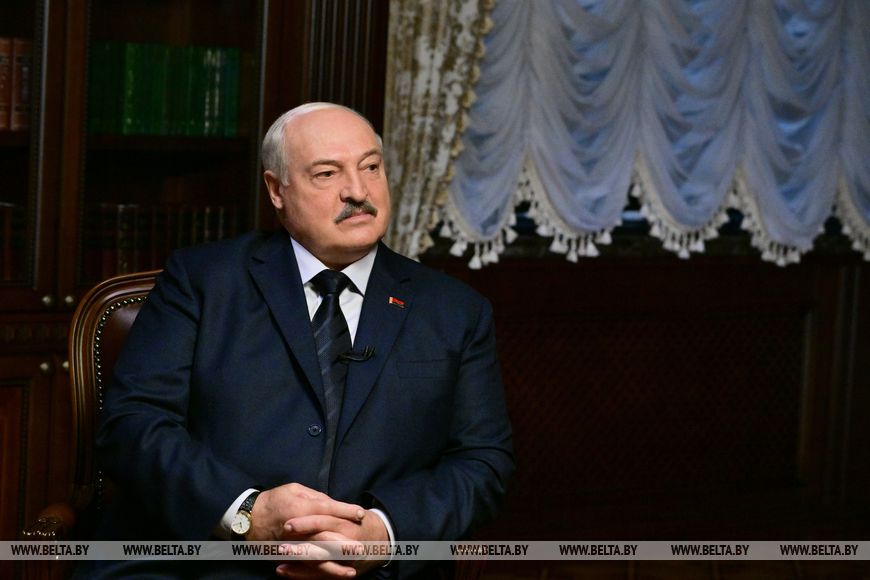
In his opinion, one should not count on European partners in these matters: they have already shown their true face when they introduced restrictions on the export of grain from Ukraine. “Trump is right by making Europe bend to his will. I just don’t want it to be a performance. And Trump can accomplish a lot. He would win the mid-term elections. He could be the new president. If not him, then JD Vance. A decent man. I like him,” the head of state said.
The president also drew attention to certain imbalanced presentation in American mass media, which say that Putin is bad, Zelensky is good, and Trump is even better.
“Make it objective. Trump is indeed a loudmouth. An example: he says one thing in the morning and does another thing in the evening. It happens. There are no results yet. He starts rattling a saber to the world like a policeman. Did you undertake leadership? You have undertaken leadership. Lead then. And leadership is about preventing clashes and wars,” the head of state remarked.
“If we have to be objective, why don’t you criticize Putin for his actions, for aggression?” the reporter wondered.
“I criticize Putin the same way. The fact that I don’t tell you about it doesn’t mean I don’t criticize him,” Aleksandr Lukashenko stated. And Putin makes certain mistakes. I am convinced that he regrets many things. But we have to proceed from the reality. Neither I, nor you, nor Putin, nor Trump can live forever. Everything will change literally within the next ten years. But let’s resolve the problem on the basis of reality today!”




